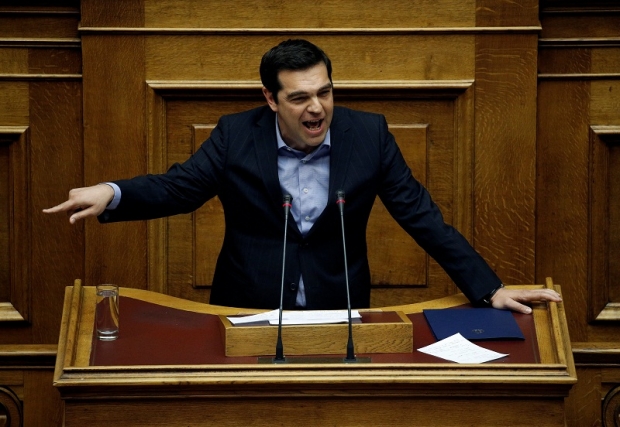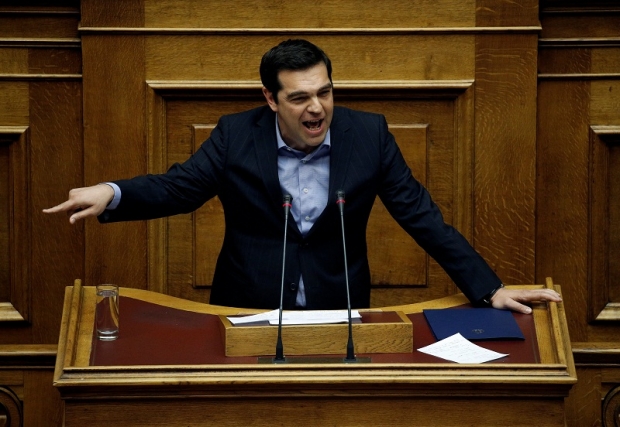Greek PM defends pension and tax reform


Greek riot police officers dodge petrol bomb thrown by protesters during minor clashes following a protest outside parliament in central Athens where lawmakers were discussing controversial tax and pension reforms May 8, 2016. REUTERS/Alkis Konstantinidis
Greek Prime Minister Alexis Tsipras has defended controversial new pension and tax reforms approved by parliament.
The measures are needed to unlock further international bailout money, to be discussed at a meeting of Eurozone finance ministers on Monday.
But they are deeply unpopular with Greek anti-austerity campaigners and trade unions.
Mr Tsipras said the changes would not affect the majority of pensioners and moved towards a "sustainable" system.
He said that new higher contributions would safeguard the country's state pension provision.
Before the vote, protesters in Athens threw petrol bombs at police, who responded with tear gas.

Trade unions say the country cannot bear another round of austerity.
Mr Tsipras said the bill aimed for a "sustainable" system that would "have social justice as its core principle", as only 7.5% of pensioners would see a cut in the money they got.
He said the Eurozone finance ministers' meeting meant Monday would be "a very important day" as debt relief for Greece was on the agenda after "six long years" of austerity discussions.
The so-called Eurogroup meeting is expected to discuss new debt relief measures, with a view to avoiding the prospect of a default in July, when Greece is due make its next major repayment to the IMF and the European Central Bank.
Tax and pension changes
The debate in Greece's parliament on the reforms lasted for two days as MPs argued whether or not to pass the unpopular pension and tax reforms.
They will reduce some pension payouts, merge several pension funds, increase social security contributions and raise taxes for those on medium and high incomes.
Thousands of people demonstrated, mostly peacefully, in Athens and in the country's second-largest city, Thessaloniki.
Three days of a general strike paralysed public transport and slowed the public sector and the media.
Speaking before the vote, the leader of the Greek Communist Party, Dimitris
Koutsoubas, said the Greek people would "not tolerate nor accept" the measures and would "show their true power" in the event of a yes vote.
Fofi Gennimata, the leader of the centre-left Pasok party, said the bill represented the "total deconstruction of the pension system".
She said the people responsible for the yes vote had "promised everything" to protesters in public squares five years ago, but were now "justifiably" frightened to leave their offices.
The leftist Syriza party secured just enough votes to pass the measures, thanks to the ruling coalition's tiny majority.
In a parliament of 300 seats, it has 153 lawmakers.
Mr Tsipras was elected as prime minister on an anti-austerity ticket but later signed up to Greece's third international bailout since 2010.
Greece agreed to a third rescue package worth €86bn (£60bn) last year.
The International Monetary Fund and other European partners are demanding that Greece implement further austerity measures to generate nearly €4bn (£3.1bn) in additional savings — contingency money in case Greece misses future budget targets.
Spending cuts
Finance ministers from countries which use the euro will assess "a comprehensive package of policy reforms as well as the sustainability of Greece's public debt" at their Monday meeting in Brussels, a statement says.
Greece's Finance Minister Euclid Tsakolotos will be at the meeting in the hope of securing a deal.
"We have done what we promised and hence the IMF and Germany must provide a solution that is feasible," he said "a solution for the debt that will open a clear horizon for investors."
Last summer, Greece's debt crisis peaked when Athens defaulted on its debt payments and raised the spectre of an exit from the eurozone.
Greece is already looking to implement spending cuts that will amount to 3% of the country's gross domestic product or €5.4bn euros by 2018.
Политика конфиденциальности | Правила пользования сайтом









